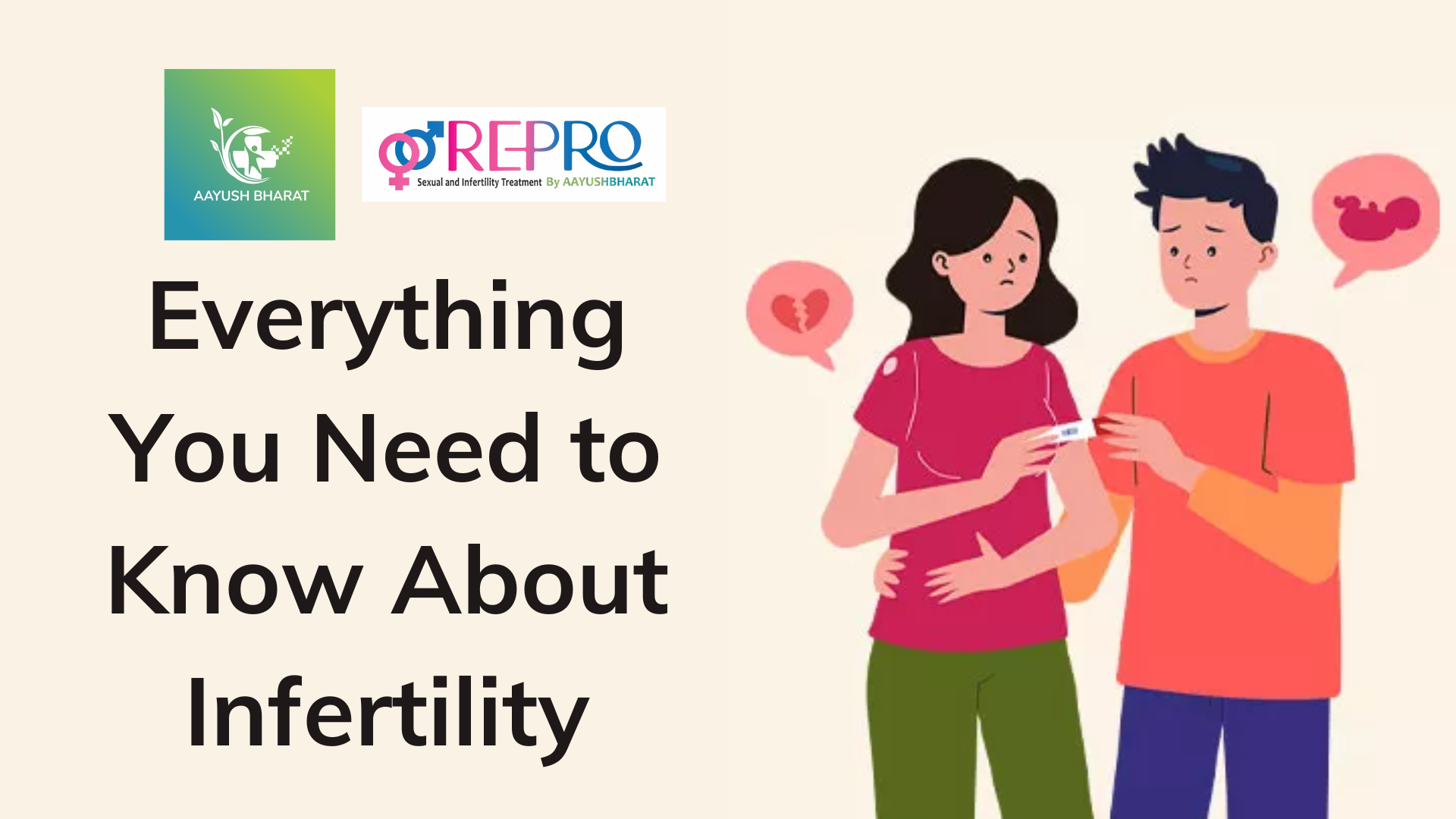Infertility is a medical condition characterized by the inability to conceive or carry a pregnancy to term after a year of unprotected sexual intercourse. It can affect both men and women and may be caused by various factors. Here’s a comprehensive overview of infertility:

Causes of Infertility:
- Female Factors:
-
-
- Ovulation Disorders: Irregular or absent ovulation.
- Polycystic Ovary Syndrome (PCOS): A hormonal disorder affecting ovulation.
- Endometriosis: The presence of tissue similar to the uterine lining outside the uterus.
- Fallopian Tube Blockage: Impairs the egg’s journey from the ovary to the uterus.
- Uterine Issues: Structural abnormalities or fibroids in the uterus.
-
- Male Factors:
-
-
- Low Sperm Count: Insufficient sperm production.
- Poor Sperm Motility: Inability of sperm to move effectively.
- Abnormal Sperm Shape: Morphological issues affecting sperm function.
- Ejaculation Disorders: Problems with the release of sperm.
-
Buy This Product:- Hamdard Roghan Badam Shirin Oil
- Combined Factors:
-
- Unexplained Infertility: When no specific cause can be identified.
- Age: Fertility decreases with age for both men and women.
Diagnosis:
- Medical History and Physical Examination:
-
-
- Detailed history of menstrual cycles, sexual habits, and overall health.
- Physical examination to check for abnormalities in reproductive organs.
-
- Ovulation Tracking:
-
-
- Monitoring menstrual cycles, basal body temperature, and hormone levels.
- Semen Analysis:
- Examination of the sperm’s quantity, quality, and motility.
-
- Imaging Studies:
-
-
- Ultrasound to assess reproductive organs.
- Hysterosalpingography (HSG) to check for blockages in fallopian tubes.
-
- Hormone Tests:
-
- Blood tests to evaluate hormone levels related to fertility.
Buy This Product:- RePro Shudh Ashva Shilajit
Treatment Options:
- Medications:
-
-
- Fertility Drugs: Stimulate ovulation in women.
- Hormone Therapy: Corrects hormonal imbalances.
-
- Surgery:
-
-
- Laparoscopy: Used for conditions like endometriosis or uterine fibroids.
- Varicocele Repair: Surgery for the treatment of enlarged veins in the scrotum.
-
- Assisted Reproductive Technologies (ART):
-
-
- In vitro Fertilization (IVF): Combining eggs and sperm outside the body before implantation.
- Intracytoplasmic Sperm Injection (ICSI): Single sperm injected directly into an egg.
-
- Lifestyle Changes:
-
- Maintaining a healthy weight, exercising moderately, and avoiding excessive alcohol and tobacco.
Emotional and Psychological Impact:
- Stress and Emotional Strain: Infertility can lead to emotional stress and strain on relationships.
- Support Groups and Counseling: Seeking emotional support can be crucial during the infertility journey.
Legal and Ethical Considerations:
- Donor Sperm, Eggs, or Surrogacy: Options available in cases of severe infertility.
- Ethical Concerns: Discussions surrounding the use of reproductive technologies and their implications.
Infertility and natural treatments:-
While medical interventions such as medications, surgery, and assisted reproductive technologies are commonly used to address infertility, some individuals also explore natural treatments and lifestyle changes. It’s important to note that the effectiveness of these approaches can vary, and consulting with a healthcare professional is crucial before starting any new treatments. Here are some natural treatments and lifestyle factors that may be considered:
1. Nutrition and Diet:
- Healthy Eating: A well-balanced diet rich in vitamins, minerals, and antioxidants is important for reproductive health.
- Folic Acid: Adequate intake of folic acid is essential for both men and women.
2. Weight Management:
- Maintaining a Healthy Weight: Both obesity and being underweight can negatively impact fertility. Achieving and maintaining a healthy weight can improve reproductive function.
3. Exercise:
- Moderate Exercise: Regular physical activity is beneficial for overall health, but excessive exercise may impact fertility. Finding a balance is key.
4. Stress Management:
- Mind-Body Techniques: Practices such as yoga, meditation, and acupuncture may help reduce stress, which can have a positive impact on fertility.
5. Avoiding Harmful Substances:
- Limiting Alcohol and Caffeine: Excessive alcohol and caffeine consumption may affect fertility.
- Quitting Smoking: Smoking has been linked to infertility in both men and women.
Click Here:- Buy Best RePro Shudh Shilajit
6. Herbal Supplements:
- Agnus Castus (Vitex): Believed to help regulate hormonal imbalances.
- Maca Root: Thought to enhance fertility in both men and women.
- Chinese Herbs: Traditional Chinese medicine may include herbal treatments.
7. Acupuncture:
- Traditional Chinese Medicine (TCM): Acupuncture is sometimes used to address imbalances and improve fertility.
8. Timing and Tracking:
- Natural Family Planning: Understanding menstrual cycles and ovulation to optimize the timing of intercourse.
- Basal Body Temperature (BBT) Charting: Tracking basal body temperature to identify ovulation.
9. Environmental Toxins:
- Reducing Exposure: Minimizing exposure to environmental toxins, such as pesticides and chemicals.
10. Supplements:
- Omega-3 Fatty Acids: Found in fish oil, believed to support fertility.
- Coenzyme Q10 (CoQ10): Antioxidant that may improve egg and sperm quality.
11. Male Fertility:
- Avoiding Hot Baths and Saunas: Excessive heat can impact sperm production.
- Boxer Shorts: Wearing loose-fitting underwear for better sperm production.
It’s crucial to approach natural treatments with caution and to involve healthcare professionals in the decision-making process. Couples experiencing fertility issues should undergo a thorough medical evaluation to identify specific causes, and any natural treatments should complement, not replace, evidence-based medical interventions. Additionally, what works for one person may not work for another, so individualized approaches are important.
Conclusion:
Infertility is a complex issue with various causes and treatments. Seeking professional medical advice early in the process can help identify and address underlying factors, improving the chances of successful conception. Emotional support and open communication are essential for individuals and couples navigating the challenges of infertility.
Frequently Asked Questions
- What is infertility, and when is it considered a medical concern?
Infertility is a medical condition characterized by the inability to conceive or sustain a pregnancy after a year of regular, unprotected intercourse. If a woman is over 35, a medical evaluation may be recommended after six months of unsuccessful attempts. Infertility can affect both men and women and may have various causes.
- What are common factors that contribute to infertility in both men and women?
Infertility can arise from a variety of factors. In women, ovulation disorders, endometriosis, and issues with the uterus or fallopian tubes are common culprits. For men, low sperm count, poor sperm motility, and abnormal sperm shape are frequent contributors. Additionally, age plays a role in fertility decline for both genders.
- How is infertility diagnosed, and what are the common diagnostic procedures?
Diagnosing infertility involves a comprehensive assessment of medical history, physical examinations, and various diagnostic procedures. Ovulation tracking, semen analysis, imaging studies (such as ultrasound), and hormone tests are commonly conducted to identify the root causes of infertility in both men and women.
- What are the available treatment options for infertility?
Treatment options for infertility depend on the underlying causes. Fertility medications, surgery, and assisted reproductive technologies (ART) like in vitro fertilization (IVF) or intracytoplasmic sperm injection (ICSI) are common interventions. Lifestyle changes, such as weight management and stress reduction, can also be recommended. The choice of treatment is personalized based on individual circumstances.
- How does age impact fertility, and when should couples seek professional help for infertility?
Age is a crucial factor in fertility, affecting both men and women. Female fertility generally starts to decline in the late 20s, with a more significant decrease after the age of 35. For men, sperm quality may decline with age. Couples struggling to conceive should seek professional help if they’ve been actively trying for a year (or six months for women over 35) without success. Early evaluation allows for timely intervention and better chances of successful conception.


0 Comments